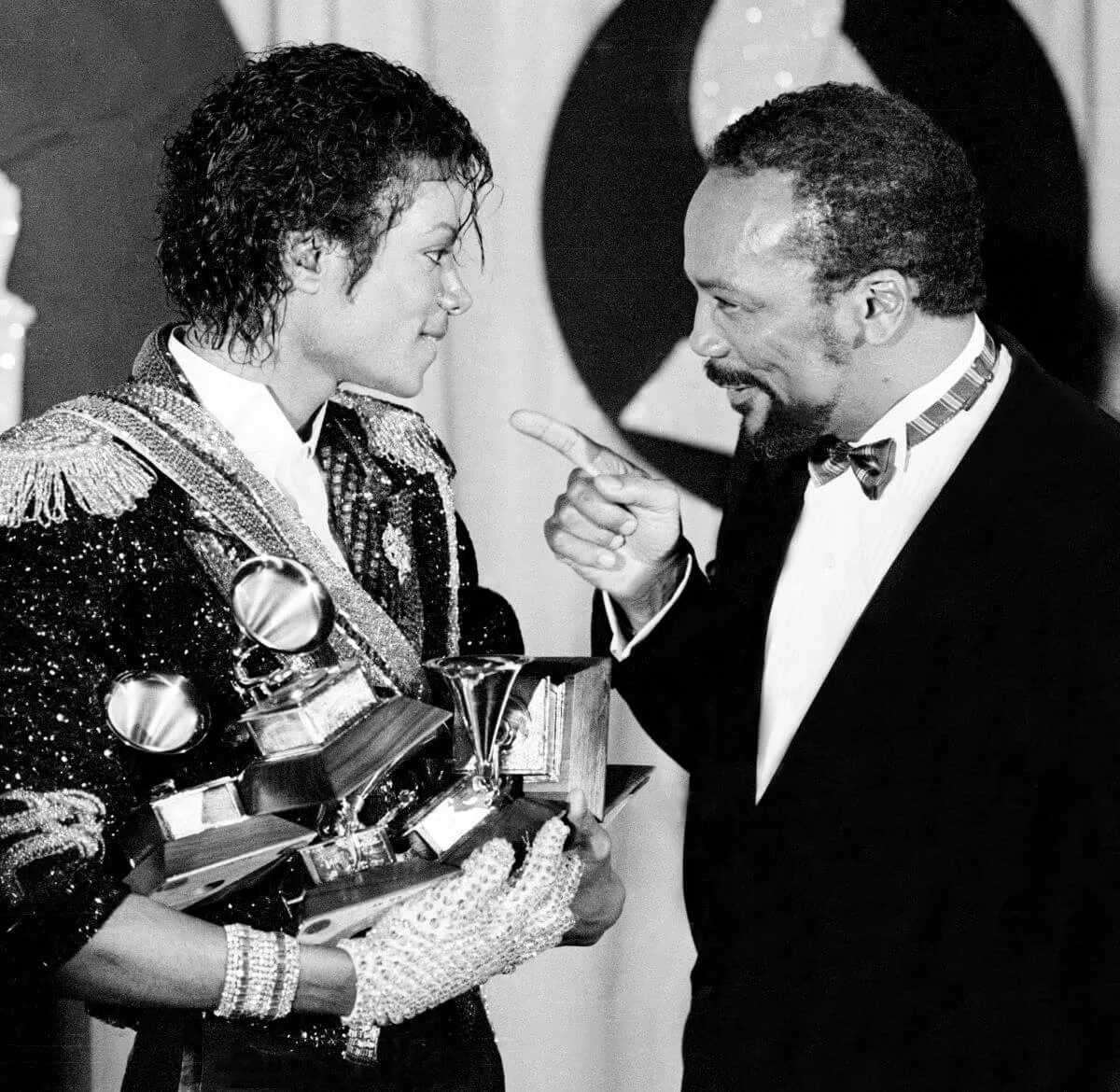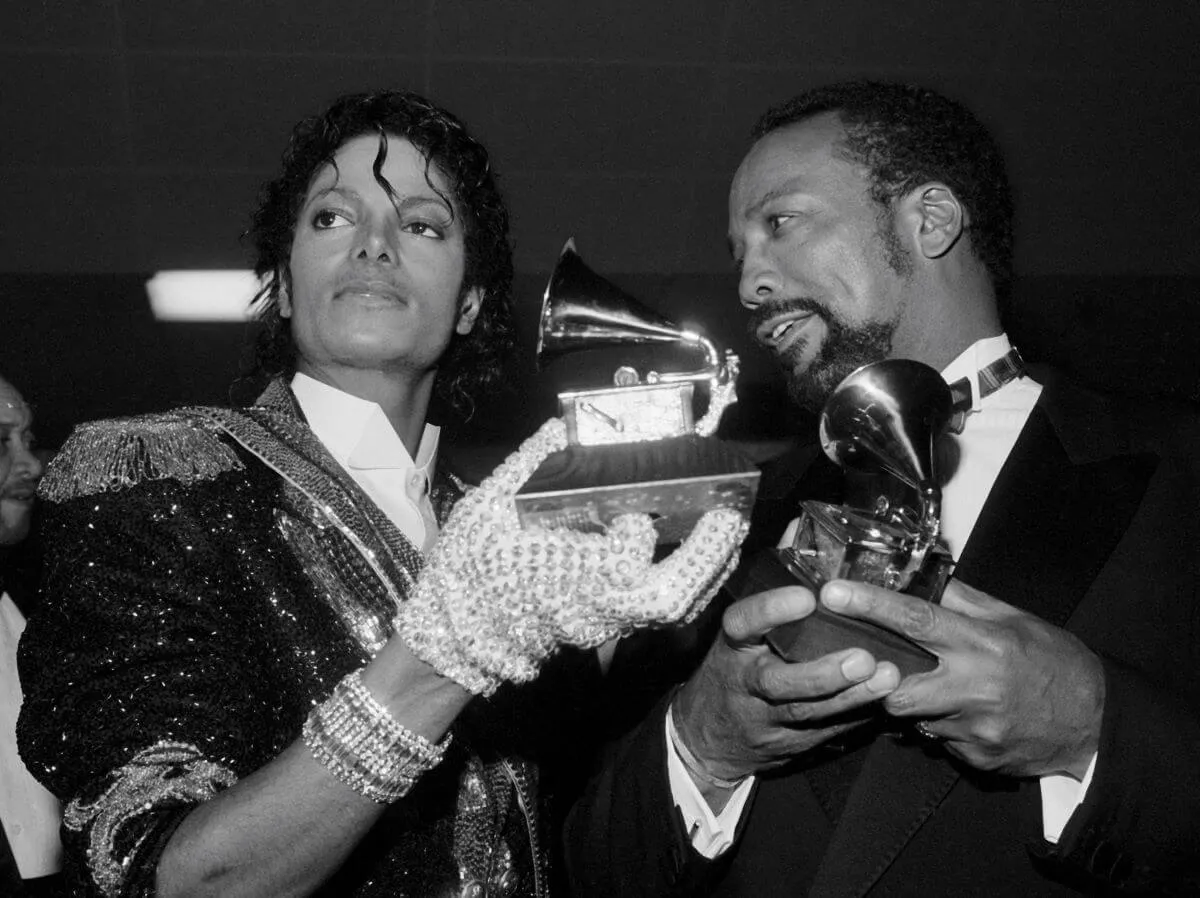
Michael Jackson Asked a Question That Gave Quincy Jones ‘Goosebumps’ and Made Him Offer to Produce ‘Off the Wall’
Michael Jackson and Quincy Jones worked together on three of Jackson’s albums. They had a strong working relationship, and Jones helped Jackson grow as an artist. According to Jones, he didn’t intend to produce Jackson’s music when he first met him. He shared the moment he realized he wanted to work with the singer.
Michael Jackson’s reaction to a correction made Quincy Jones want to work with him
Jones first met Jackson when he was a child. Years later, they reconnected on the set of The Wiz. Jackson played the Scarecrow, and Jones composed the film’s score. Before they started filming, Jackson asked Jones if he would find him a producer for his latest album.
“In 1978, Sidney Lumet pulled me kicking and screaming into doing the music for The Wiz, and in hindsight I’m so glad he did,” Jones wrote for the LA Times following Jackson’s death. “As the scarecrow, Michael dove into the filming of The Wiz with everything that he had, not only learning his lines but those of everyone in the cast. Prior to filming, Michael and I were working at my home and he asked if I could help find him a producer to work with him on his first solo album from Epic.”

Jones was on set, and corrected Jackson after he continually mispronounced “Socrates.”
“At rehearsals, during the part where the scarecrow is pulling proverbs from his stuffing, Michael kept saying ‘So-Crates’ instead of ‘Socrates,’” Jones explained. “After about the third time, I pulled him aside and told him the correct pronunciation.”
Jackson’s reaction made the producer decide then and there that he wanted to work with him.
“He looked at me with these big wide eyes and said, ‘Really?’ and it was at that moment that I said, ‘Michael, I’d like to produce your album,’” Jones recalled. “It was that wonderment that I saw in his eyes that locked me in. I knew that we could go into completely unexplored territory, a place that as a jazz musician gave me goosebumps.”
The producer shared how he helped him grow as an artist
They set to work on Jackson’s 1979 album Off the Wall. Jones said he did everything he could to help Jackson improve as an artist.
“We tried all kinds of tricks that I’d learned over the years to help him with his artistic growth, like dropping keys just a minor third to give him flexibility and a more mature range in the upper and lower registers, and more than a few tempo changes,” he wrote. “I also tried to steer him to songs with more depth, some of them about real relationships — we weren’t going to make it with ballads to rodents (i.e. ‘Ben’). And Seth Riggs, a leading vocal coach, gave him vigorous exercises to expand his top and bottom range by at least a fourth, which I desperately needed to get the vocal drama going.”
Their hard work paid off.
“We approached that record like we were going into battle,” Jones wrote. “Off the Wall would sell 10 million copies.”
Quincy Jones described Michael Jackson as hardworking
Jones went on to produce two more albums for Jackson. He came to see the singer as a tirelessly working artist.
“This blessed artist commanded the stage with the grace of an antelope, shattered recording industry records, and broke down cultural boundaries around the world, yet remained the gentlest of souls,” Jones wrote. “Michael Jackson was a different kind of entertainer. A man-child in many ways, he was beyond professional and dedicated.”

He said that Jackson managed to achieve all that he intended.
“Evoking Fred Astaire, Sammy Davis Jr., and James Brown all at once, he’d work for hours, perfecting every kick, gesture, and movement so that they came together precisely the way they were intended to,” Jones wrote. “Together we shared the ‘80s, achieving heights that I can humbly say may never be reached again and reshaped the music business forever.”


